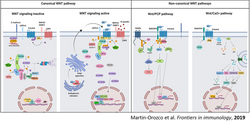Research Interest

Understanding the molecular signaling mechanism involved in chemo resistance and metastasis development in CRC
Colorectal cancer (CRC) progression and poor therapeutic outcomes are driven by multiple molecular signaling pathways that control Drug resistance (chemoresistance), Tumor invasion and metastasis. These processes are interconnected. Many of the same pathways that promote metastasis also enhance resistance to chemotherapy-induced cell death. Key Molecular Signaling Pathways Involved: Wnt/β-catenin signaling, PI3K/AKT/mTOR pathway, MAPK/ERK signaling and miRNAs and Non-coding RNAs and many others. In our lab we are engaged in deciphering the crosstalk different signaling pathways to understand the chemoresistance and Metastasis better which may enable us to identify novel modulators of plant and chemical origin which coluld be developed as therapeutic agents.
 |
|---|
Understanding Immune functions of intestinal epithelial cells and cellular signalling network in intestinal diseases.
Intestinal epithelial cells form a monolayer of cells that define the boundary between tissues of the
intestine and the external environment. Six different cells comprise the family of IEC which coordinate the functions of IEC i) Barrier function and ii) nutrient absorption functions. IECs also play important role in innate immune function in intestinal area, such as production of proinflammatory (IL-1β, IL-8, CCL-20) and anti inflammatory/ regulatory (IL-10, TGF-β) cytokines, antimicrobial peptides like cathelicidin, defensin as well as retinoic acid production. Any dysregulation of dysregulation of IEC functions may lead to leads to the development of many infectious, inflammatory, autoimmune, allergic diseases most notably inflammatory bowel disease (IBD) and subsequent development of colorectal cancer (CRC). In our lab, we are exploring the involvement Wnt signaling in different immune functions in IEC. Wnt signaling is known to be crucial in regeneration and differentiation of the intestinal epithelium. Binding of Wnt ligands to their receptors, mostly from Frizzled (FzD) family, leads to stabilization and accumulation of β-catenin in the cytoplasm. Accumulated β-catenin then translocate into the nucleus to create a complex with transcription factors of the LEF/TCF family to activate target gene transcription. Other important signaling which could be playing vital role in immune functions of autophagy pathway. Autophagy pathway is the regulated mechanism by which cells clear unnecessary or dysfunctional components. Our lab is also exploring the possible crosstalk between Wnt-autophagy pathway to find the mechanism of regulation of immune function maintenance.
 |  |  |
|---|
Phytochemical based treatment strategy against intestinal diseases
“Phytochemicals” the name came from Greek word phyto, which mean "plant" are chemicals made by plants through their primary or secondary metabolism. Although these compounds play important role in plant growth and defense, it attract research communities all over the world because of their ability to induce health benefits to human. However, molecular mechanisms and specific phytochemicals in the plant extract are not established clearly yet. Another possible advantage of using phytochemicals over the conventional treatment strategy is the less or no side effects. However, it caught attention of researchers to explore their possible health benefits against those disease where cheap treatment strategy is not available yet. In our labs are currently employing phytochemicals extracted from natural plant sources to study the health benefits against colorectal cancer and inflammatory bowel diseases. The plant sources which are currently being used are mainly olive oil and green tea etc. We are using computational biology based screening of phytochemicals able to strongly interact with target proteins important for disease progression, followed by the in vitro and in vivo studies to evaluate the efficiency of these phytochemicals to treat IBD and CRC.
 |  |  |  |
|---|---|---|---|
 |



